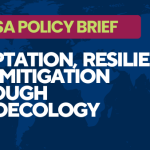AFSA commends breakthrough in SB-60 Agriculture Climate Talks: Calls for Agroecology to Spearhead Climate Action
The Alliance for Food Sovereignty in Africa (AFSA), a continental coalition of civil society organizations with 41 member organizations active in 50 African countries and working with over 200 million Africans, welcomes a positive breakthrough in the SB-60 Bonn climate negotiations on Agriculture. After prolonged standstill, parties have constructively engaged and finalized a draft text on agriculture, marking a pivotal end to the previously stalled negotiations.
AFSA applauds the inclusion of a “Systemic and holistic approaches to implementing climate action on agriculture, food systems and food security, understanding, cooperation and integration into plans” to agriculture and food security as one of the future workshop topics in the negotiation text. AFSA consider agroecology a comprehensive and holistic approach to food security and food systems and will welcome the opportunity to demonstrate this during the workshops.
AFSA also urges governments include agroecology in their recommendations for workshop topics for topic 1. Agroecology is a transformative technique that promotes food security, alleviates hunger and malnutrition, revitalizes soils, restores biodiversity, and combats climate change. Agroecology promotes social justice by addressing inequities from production to consumption and linking agricultural methods with larger environmental and social aims.
AFSA also commends the negotiators for the inclusion of food systems text in the draft decision. This is in line with the Africa Unions work on food systems as well as with AFSA’s and other actors work on African food policy. This also speaks to the commitment of African countries to the COP 28 Emirates Declaration on Sustainable Agriculture, Resilient Food Systems, and Climate Action, committing to integrate food into their climate plans by 2025
AFSA sets forth the following key demands as a way forward for future negotiations:
Prioritize Agroecology: Parties are urged to prioritize and include agroecology in their recommendations for workshop topics for topic 1, as a transformative farming approach for a resilient, sustainable, and systemic response to climate change adaptation and mitigation efforts in Africa.
Fulfill Finance Commitments: It is crucial to not only meet but exceed current financial pledges. The finance bodies and developed countries must ensure that climate finance is readily accessible through grants rather than loans, particularly for the most vulnerable communities.
Community-Focused Solutions: Commit to the strategic allocation of climate finance to support local, community-driven solutions that assist small-scale food producers, pastoralists, fisheries, and indigenous groups.
Set Concrete Adaptation Targets: Adoption of quantifiable targets and measures to mobilize finance for sustainable adaptation is key, with a focus on agroecological solutions that provide resilience and sustainability.
Reject False Solutions to Climate Change: Move away from so-called solutions like Climate Smart Agriculture, Nature-Based Solutions, and Carbon Trading, which fail to address the root causes of climate change and do not deliver genuine benefits to those most affected.
As we move towards COP29 and beyond, AFSA remains steadfast in its commitment to advocate for agroecological integration within global climate policies. The decisions we make today will shape the future of our food systems, the health of our planet, and the livelihoods of millions. It is time for bold, decisive action that aligns with the principles of sustainability, equity, and justice.
ABOUT AFSA: The Alliance for Food Sovereignty in Africa is a continental coalition of civil society organizations advancing food sovereignty and agroecology across the African continent. It comprises African food producer networks, indigenous people’s organizations, faith-based organizations, women and youth groups, and consumer movements. AFSA is a ‘network of networks’ with 41 member organizations active in 50 African countries, impacting around 200 million individuals.
Web: www.afsafrica.org Email: afsa@afsafrica.org

































